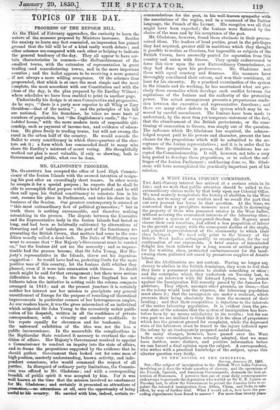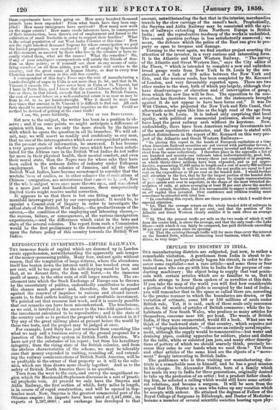A WEST INDIA INQUIRY COMMISSION.
THE Anti-Slavery interest has arrived at a curious crisis in its fate ; and we wish that public attention should be called to the extraordinary claims made by that body upon our Colonial Office. We need scarcely recapitulate the history of abolition in the West Indies, nor to many of our readers need we recall- the part that our own journal has borne in that question. At the time, wo contended that a precipitate measure must result in destroying the property of those who possessed estates in the West Indies, without securing the economical interests of the labouring class ; that under a system of unprepared freedom the Negroes must choose their own vocations, and afford a less proportion of labour to the growth of sugar, with the consequent decline of the staple, and general impoverishment of the community to which their class belonged. We need only point to the history of the British West Indies subsequently to emancipation, for the sad confirmation of our arguments. A brief season of intoxicated delight has been followed by a long season of settled poverty for the working class, protracted embarrassment for the land- owning class, palliated not cured by precarious supplies of Asiatic) labour.
But the Abolitionists are not content. Having no longer an slavery to abolish in the British dominions, they seem to feel that they have a permanent mission to abolish something or other ; and the enterprise which they undertook on Tuesday last, in seeking an interview with Sir Edward Lytton, was to protest against the Immigration Bill recently passed by the Jamaica Le- gislature. They object, amongst other grounds, on these,—that as the colony would bear the expense, the labouring population must share it ; that the immigrants are under a contract, which prevents their being absolutely free from the moment of their landing ; and that their competition is injurious to the interests of the native labouring population. It is evident from the pre- sent state of the colonies that the system of immigration has here- tofore been by no means satisfactory in its results ; but for our own part we are inclined to think that it is the class of proprietors which has the greatest ground for complaint, while the depressed state of the labourers must be traced to the injury inflicted upon the colony by an inadequately prepared social revolution. So many changes, however, have passed over the West Indies since emancipation was actually adopted, that we must have further, more distinct, and positive information before we can hazard a final opinion upon the subject. A correspondent, who writes with a practical knowledge of the subject, opens this ulterior question very fairly.
TO THE EDITOR OF THE SPECTATOR.
Surrey, January 27, 1869.
SIR—The subject of immigration to the British West India Colonies, involving as it does the whole question of slavery, and the operations of the French, Spanish, and American Governments, demands the best at- tention of Statesmen. I perceive that one of your daily contemporaries endeavours to persuade the deputation who waited on Sir E. B. Lytton on Tuesday last, to allow the Government to permit the Jamaica laws to re- gulate the intended immigration from Africa, China, and India to take effect, by way of further trial. What I would ask is, how have the pre- ceding experiments been found to answer ? For more than twenty years
these experiments have been going on. How many hundred thousand pounds have been expended ? From what funds have they been sup- plied ? How many immigrants have survived ? How many now work on the sugar estates ? How many creole labourers have, in consequence of their introduction, been thrown out of employment and forced to the cultivation of small freeholds in order to support their families ? What is the actual population of our West India Colonies at this time ? How are the eight hundred thousand Negroes for whose emancipation we paid the landed proprietors, now employed ? If out of employ by thousands at this moment, as asserted by those who live in the colonies or have re- cently visited them, what are the causes ? What the remedies ? Sir, if any of your intelligent correspondents will satisfy the friends of free- dom on these points ; or if yourself can show us any means of satis- fying ourselves on all these points, you will render real service to the country, and the great cause of human liberty, so dear to every true Christian man and woman in this still free country. A correspondent of this day's Times says the cost of manufacturing a hundredweight of sugar in Cuba is not more than 2a. 3d., and that in St. Vincent it exceeds 198. I have never been in Cuba or St. Vincent, but I have in Porto Rico, and I know that the cost of labour, whether it be free or slave, in that island, exceeds that in Jamaica. In British Guiana, the cost of manual labour on a well-conducted estate is as near as may be from 48. 6d. to 68. per hundredweight. Why it should be more than four times that amount in St. Vincent it is difficult to find out. All such facts should be ascertained by impartial inquiries on the spot. Could no method be devised of getting at the exact truth ? I am, Sir, yours faithfully, ONE OF THE DEPUTATION.
Not new to the subject, the writer has been in a position to ob- serve; and if on some points we might anticipate a difference of opinion with him, we are only the more struck by the fairness with which he opens the question in all its branches. We will ad- mit, nay, we will assert as readily and confidently as any man, that no one of the interrogatories which our correspondent puts can, in the present state of information, be answered. It has become a very grave question whether the races which have been substi- tuted for the African race in the British West Indies do not suffer far more in their physical health, their mental comfort, and even their moral state, than the Negro race for whose sake they have been called to the arduous duties of industry under Eutopean employment. Yet the colonies of Jamaica, and all the other British West Indies, have become accustomed to consider that the wretche 'fleas of coolies, as in other colonies the al.orninations of Chinese -migration, are misfortunes that easu:ot be bt. d. Now if the win le subject were once more thrown op3n, and cuto,..dered in a more just and hard-headed manner, these comparatively limited views might receive useful correction.
It appears to us that there is but one fitting answer to the manifold interrogatory put by our correspondent. It would be, to appoint a CommiEsion of Inquiry in order to investigate thee actual state of the British West Indies,—the productiveness of the estates,—the condition of the employing and labouring classes,— the success, failure, or consequences, of the various immigration 'experiments,—and the differences which exist in the laws and .state of the several colonies. The report from such a Commission would be the first preliminary to the formation of a just opinion upon the future policy of this country towards the British West Indies.



























 Previous page
Previous page